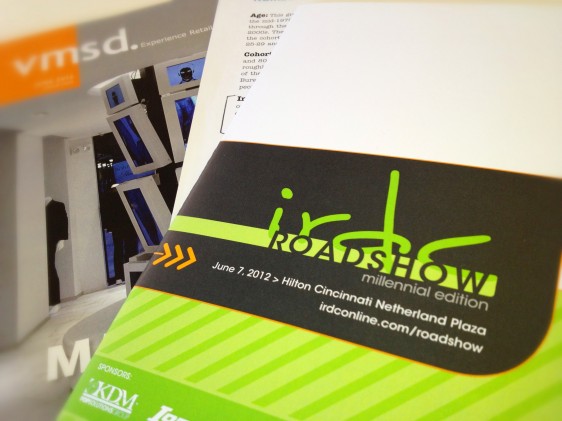Jump’s take on this year’s Interior Retail Design Conference examining the shopping habits of the millennial generation
15, Jun. 2012
The International Retail Design Conference (IRDC) held their Roadshow on June 7th in Cincinnati. Up for discussion this year, the millennial generation. Among the attendees were Jump Branding & Design’s President Eric Boulden and Creative Director Jerry Alfieri. The Conference was designed to arm retail designers, like the team at Jump, with everything they need to know about attracting contemporary millennial shoppers. Featuring an expert led panel discussion, and insight from retail giants such as Starbucks and Macys, the Conference examined the experiences and successful strategies of business leaders in targeting this all-important generation that by 2015 will rise to be the largest shopping cohort in the world.
Before understanding the shopping habits of this generation, it is important to uncover who this generation really is. The term millennials applies to those born from the mid 1970s through the early 2000s, primarily the current 18-35 age demographic. The unique nature of the millennial generation’s retail habits partly stem from their distinctive societal outlook by way of a more progressively slanted upbringing. Being the first generation to really be engaged and encouraged to speak their voice from childhood has given them a sense of belief, not only as individuals but further as a collective whole. The power to change has become embedded in the generation’s outlook and thanks to the rise of communicative technology could actually become realized. This instantaneous, globalized connectivity has also given millennials an ambient awareness of what’s happening around the world as well as in each other’s lives. While long diagnosed as the ‘me’ generation due to their perceived self-focus and aim towards individuality, the contemporary social climate has led to a distinct group gaze and a ‘we’ generation marker may be more appropriate.
The world today is much different than ever before with a society that as a whole is more tolerant, morally sophisticated and multi-cultural than any historically. Developing in this world has given the millennial generation a feeling of responsibility and an attitude that is both optimistic and realistic. Moreover, with the effects of an economy in recession and a high-saturation of college-educated candidates competing in the job market, this is a generation that is being forced to cutback in comparison to their parents. An attitude toward shopping and consumption has overall manifested from an environment that has left millennials relatively socially rich yet financially poor.
Some key areas on the millennial generation’s shopping habits that the Conference addressed:
Millennials are fickle:
In part as a result of the recent economic recession, people under 35 today are worth 66% less than their predecessors 25 years ago. The trend amongst this group of shoppers is to research items heavily before even considering making a purchase. Even when they’ve researched through and through, they are relentless in pursuing the best possible deal. Their focus is on maximizing the benefits of each purchase and is derivative of much more than comparing prices.
Millennials are connected:
For this generation, digital is the norm. They are not used to waiting for products and services and have become accustomed to having limitless choices at the touch of a button or screen. This has fostered a customer environment where shoppers are always plugged in. User reviews, accessible on mobile devices, have become an integral part of their purchasing decision process. Comprehensive company websites and retail environments that engage their technological sensibilities are a must in targeting the millennial market mindset.
Millennials are responsible (…or at least they want to be):
By and large, the millennial generation does not base their purchasing decisions on utility alone. Often, they focus on items that they feel will reflect their lifestyle choices. Brands have become an essential way of identifying, expressing and supporting what they find personally important and product preference is often derivative of perceived corporate social responsibility. Companies that focus on ethical and sustainable practices appeal particularly to the all-important educated, young professional set. Using brands and their purchasing decisions to embody their perceived values in turn makes them feel good about themselves. Creating a corporate social dialogue is crucial in crafting an effective millennial-targeted brand strategy.
The most important take-away from the IRDC Roadshow Conference this year is that targeting millennials requires a layered approach. Companies need to create strategies that embody the experiences, expectations and values of the latest generation to penetrate the market place. Focus on creating retail environments that support what millennials find personally important and give them something to talk about – there’s sure to be someone listening.
Make sure to stay current, creative and connected by checking out the International Retail Design Conference’s website and upcoming events.
